Phillip Seymour Hoffman Synecdoche New York Interview
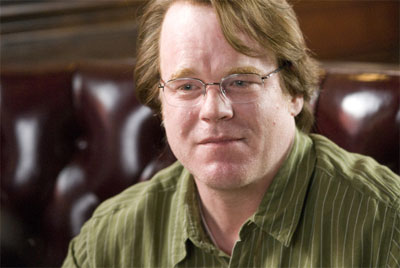
HOFFMAN THRIVES ON TAKING RISKS.
Phillip Seymour Hoffman, Synecdoche, New York Interview by Paul Fischer in Toronto.Few actors take as many risks as an actor than the formidable Phillip Seymour Hoffman. To be seen later this year in the highly anticipated Doubt, the Oscar winner first will be seen in the rather odd Charlie Kaufman-directed Synecdoche, New York. Of course if you ask Mr Hoffman it wasn't that odd to him reading it. The actor stars as theater director Caden Cotard who is mounting a new play. Fresh off of a successful production of Death of a Salesman, he has traded in the suburban blue-hairs and regional theater of Schenectady for the cultured audiences and bright footlights of Broadway. Armed with a MacArthur grant and determined to create a piece of brutal realism and honesty, something into which he can put his whole self, he gathers an ensemble cast into a warehouse in Manhattan's theater district. He directs them in a celebration of the mundane, instructing each to live out their constructed lives in a small mockup of the city outside. As the city inside the warehouse grows, Caden's own life veers wildly off the tracks.
The shadow of his ex-wife Adele, a celebrated painter who left him years ago for Germany's art scene, sneers at him from every corner. Somewhere in Berlin, his daughter Olive is growing up under the questionable guidance of Adele's friend, Maria. He's helplessly driving his marriage to actress Claire into the ground. Sammy Barnathan, the actor Caden has hired to play himself within the play, is a bit too perfect for the part, and is making it difficult for Caden to revive his relationship with the alluringly candid Hazel. Meanwhile, his therapist, Madeline Gravis, is better at plugging her best-seller than she is at counseling him. His second daughter, Ariel, is retarded. And a mysterious condition is systematically shutting down each of his autonomic functions, one by one. As the years rapidly pass, Caden buries himself deeper into his masterpiece. Populating the cast and crew with doppelgangers, he steadily blurs the line between the world of the play and that of his own deteriorating reality. As he pushes the limits of his relationships, both personally and professionally, a change in creative direction arrives in Millicent Weems, a celebrated theater actress who may offer Caden the break he needs.
The film premiered at this year's Toronto Film Festival which is where Paul Fischer caught up with him for this interview.
QUESTION: When you read a script like this, Phillip, it's obviously a very dense kind of work. And is it easy to look for the character and to find character in such a densely dramatic piece as this?
PHILLIP SEYMOUR HOFFMAN: Well, it's never easy, anything you do. Any film you do. It's always a difficult thing. No. I mean, it's very - you know, the events that happen to him aren't clouded, or shrouded in any mystique. They're pretty real things that happened to him. So, not really.
QUESTION: Was this a hard character for you to get in touch with? And talk about the physicality of doing this.
PHILLIP SEYMOUR HOFFMAN: Yeah. I mean, there's a lot of the prosthetics, and the getting older and all that. And - is there emotional tax in this part? Because you're hitting so many events of his life. You know, you're really going through every tragedy or trauma that he goes through, you know? That a person would go through over a span of 40 years, you know? On top of his growing old and physically deteriorating, and living in a world that's kind of falling apart around him, too. You know? Yeah, that's not pleasant stuff.
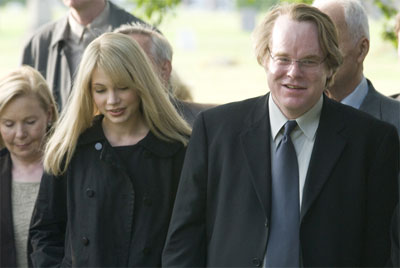 QUESTION: Is it easy for you to deal with those topics of anxiety, for example? Is it something that you're interested in getting into, those topics, as an actor? To face the fears? Or is it something that you usually try to avoid?
QUESTION: Is it easy for you to deal with those topics of anxiety, for example? Is it something that you're interested in getting into, those topics, as an actor? To face the fears? Or is it something that you usually try to avoid?PHILLIP SEYMOUR HOFFMAN: I think as a person, I'm a little less obsessed about some of the things that he is. But there's other ways - you don't have to be literal like that. You know, I understand having fears, having anxieties about yourself and your life.
QUESTION: When you read a script like this - not that you've read many scripts like this - is it a sense of exhilaration? It's so different.
PHILLIP SEYMOUR HOFFMAN: Yeah, it is different. It's a challenge set out before you that's really exciting, you know? There's a lot to do in that film. You know, there's a lot of things that happen in that film. And to go through all those - to really go through a man's life like that - I mean, it was really something. To really experience everything in such a full scope. It's intense.
QUESTION: What about the experience as a reader?
PHILLIP SEYMOUR HOFFMAN: It's very clear. No, it's not unclear, what you're reading. I mean, it's very clear. It starts out, and the guy tells you that he wakes up, and it's this time, and he goes downstairs, and the milk says it's two months later. So you realize that time is going by very fast for him. Which I understand. I mean, I think that's what life's like. And that his wife is a really good painter, decides to leave him, and doesn't respect his work. And she does, and she takes his child. And he's supposed to visit, and he doesn't. And she never comes back. And then there's another woman that he is fond for, and eventually gets up the gumption to ask her out. And he thinks his wife's only been gone for, like, a week or two, but she's been gone for a year. Which, I understand that, too. Because obviously it tells you that the pain of missing them is just as sharp now as it was then. Which I think's - so it's not unclear. It's all very clear. He doesn't - again, if you read the script, it's not shrouded in anything.
QUESTION: But you read it as an actor, though. That's how you're looking at it - the motivations of your character are always clear, you're saying. But the architecture of the script, it would seem to me, would be very daunting.
PHILLIP SEYMOUR HOFFMAN: Well, no. It's like James Joyce - if you read Portrait of an Artist As a Young Man-go read that. Would you say, "God, this is a strange piece. How'd you understand that?" You wouldn't say that about that. You know what I mean? If you go back - I actually have read that recently. Not because of this script, but actually I have over the past year. Reading that. And it's brilliant. It's obviously brilliant. But, I mean, it's brilliant because you actually feel his youth. You feel his experience, because of the way he's going about - it's not confusing. Do you know what I mean? But it's not like normal narrative.
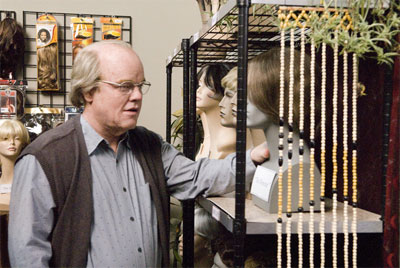 QUESTION: Not conventional.
QUESTION: Not conventional.PHILLIP SEYMOUR HOFFMAN: Yeah, but it doesn't make it not narrative. It doesn't make it not story. It doesn't make it not still a tale of being a child. You know? And it's the same thing here. And that's why she said it. It's like, because he's using a different style of narrative, because he's expressing things in a different way visually, filming-wise, that doesn't mean that you're still not watching the tale of a man going from the age of 40 to 80, and everything that happens to him in between.
QUESTION: It must have been very gratifying for you to - I mean, actors often complain that there's not enough really good roles. You seem to be the exception to the rule. You're attacking these really complex, interesting characters from film to film. Are you surprised by that at all?
PHILLIP SEYMOUR HOFFMAN: I'm grateful, more than anything. I feel lucky. I really do. I feel like I've been given more than most people should be given as actors. And I understand that.
QUESTION: Are you trying to be as selective as you can?
PHILLIP SEYMOUR HOFFMAN: No. Yeah, I want to do the things I want to do. But I've been really lucky to be offered opportunities to work with a lot of different people, and great people, and interesting scripts, you know? And - I mean, if all of a sudden I lost my voice and couldn't talk any more or something, and I couldn't act that way, I think I would have an innate understanding that there's something to be satisfied about what's happened so far. Do you know what I mean? So I'm quite aware of that, and I'm happy about it, you know? But it's not about me being overly selective. I think it's about me being offered. I mean, people have been gracious enough to give me these opportunities, really. It's not about me going, like, "No, no, no, no, no. I gotta find the great thing. Where is it? Where is it?" It's more people coming to me and being gracious.
QUESTION: What was it in this case? You're used to working with the masterminds of the industry. Was Charlie Kaufman something special, where you said, "This is really what I want to do?"
PHILLIP SEYMOUR HOFFMAN: Absolutely. I mean, I think that's obvious. I think that's obvious. I think that he's something special. I think it's clear. I don't think there's doubt. I don't even think you could argue that. And if you did, I'd argue with you. I mean, it's just sort of - no, but you know what I mean? If someone argued that, I'd be like, "How can you say that?" I mean, yeah. You might not like it, you might not - but how can you say that he's not someone special in this field? Because he just is. What he's given, what he's already done, what he's already taken part in is already - you know, an incredible body of work.
QUESTION: What do you look for in a script? How do you know that something is right for you?
PHILLIP SEYMOUR HOFFMAN: You just kind of do, you know? You just kind of - you're drawn to it. You can't stop thinking about it. I remember Laura Linney put it really well. It's like, when you're reading a script, you start asking questions. Like, you immediately start thinking about, "Well, why would that person"-you immediately start doing your work, and you don't know you're doing it. You just instinctively start doing the work. And that's a really good answer. Because it's like, you don't know why- you just know that you're curious. You're innately curious about what it is. And that's the beginning of you on the road to saying yes to something.
QUESTION: Do you want to do more comedy? Because you're obviously very good at that as well -
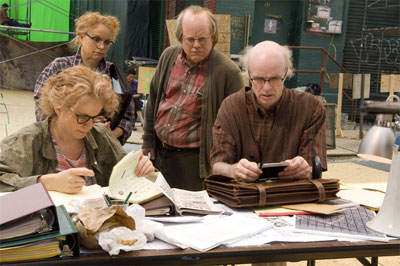 PHILLIP SEYMOUR HOFFMAN: I think I do a lot of comedy. I'm always so baffled at that question. Like, I think Savages is a drama.
PHILLIP SEYMOUR HOFFMAN: I think I do a lot of comedy. I'm always so baffled at that question. Like, I think Savages is a drama.QUESTION: Really?
PHILLIP SEYMOUR HOFFMAN: Yeah. I mean, it's a drama with funny things in it. I think - yeah, it is. I mean, it's about their father having dementia, and then they're seeing their father at the end of their life that they don't know. I think I've done a lot of films that are dramatic pieces that have a lot of humor in it. I think that's kind of - I've done more of those than probably anything else. Working with Paul Thomas Anderson, and Todd Solondz, and the Coen Brothers. It's just kind of the thing I'm drawn to, you know?
QUESTION: Maybe it's a ridiculous question, but I have to ask it anyway. Looking back, you produced one movie, right? It was Capote. Looking back, why did you produce it? Did you know before that this was a part that might be good enough -
PHILLIP SEYMOUR HOFFMAN: They came to me. Bennett Miller and Dan Futterman came to me to do it. And my assistants - one of my first - she wanted to be a producer. And so she stopped being my assistant. And - no, she did. So we became - she became a producer with me. And that was right around the time when Capote was in the talks to being done. So we came on board as producers, because we were so - our relationships with the writer and the director were so close. I'd known them since I was a teenager. And Caroline Baron, the other producer, and then Bill Vince, that came on board. He passed away this year. We all worked together. So that's where Cooperstown - my company came out of that production.
QUESTION: So what's the next plan with that production company?
PHILLIP SEYMOUR HOFFMAN: Well, we have a few different films that we're trying to get off the ground, you know? And we're close. We're close.
QUESTION: Do you find that side of the business kind of frustrating at times?
PHILLIP SEYMOUR HOFFMAN: Yeah. It's not really my cup of tea. But my producing skills are more the creative end. The development of things.
QUESTION: What about directing?
PHILLIP SEYMOUR HOFFMAN: Yeah, yeah. Maybe directing. That's what I mean. My producing skills are really with the hands-on work with the directors.
QUESTION: You've directed in the theatre a lot.
PHILLIP SEYMOUR HOFFMAN: Yeah. That's what I know how to do. I know how to produce through the directors and the writers and the development of projects. But the business, that negotiation side, that's not my thing. I leave that up to my partner, Emily. Emily Ziff does all that stuff.
QUESTION: What is next for you?
PHILLIP SEYMOUR HOFFMAN: I'm directing a play right now in London. That's what I'm doing. So I'm leaving here tonight.
QUESTION: Which one?
PHILLIP SEYMOUR HOFFMAN: It's called Rifle Mine. It's a new play that I did in Sydney about a year ago. And I'm going to go back to London tonight and tech the show in, and get the ball rolling.
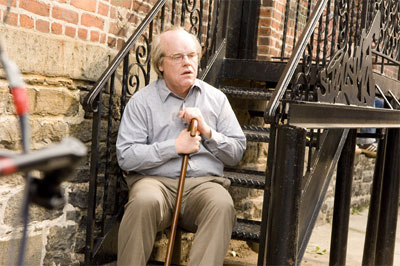 QUESTION: As you said before, you're getting one great role after another. Are you getting surprised if you're getting these phone calls, that people want to work with you? Or has it become business as usual? Is it a surprise if someone calls you up, or is it more - yeah. It's good.
QUESTION: As you said before, you're getting one great role after another. Are you getting surprised if you're getting these phone calls, that people want to work with you? Or has it become business as usual? Is it a surprise if someone calls you up, or is it more - yeah. It's good.PHILLIP SEYMOUR HOFFMAN: Yeah. Some people, it is. It's like, "Wow, that's - I'm flattered." You know? Sometimes people call up and you're so flattered. They're very special. But you can't, because you're too busy, or you just can't. But no. Like I said, you really try to stay aware of - you've got to have your gratitude in check. You know, you can't lose that. Because it's not going to be like that forever. You know, eventually - look, I know that there'll come at I mean when there won't be as much there available, because of wherever I am in my life. Or I won't be as available, or whatever. So you take advantage of those things that come along.
QUESTION: What keeps you grounded?
PHILLIP SEYMOUR HOFFMAN: Nothing.
QUESTION: Nothing keeps you grounded?
PHILLIP SEYMOUR HOFFMAN: No. Meaning that it's like - I don't think, like, "What am I going to do to keep me grounded?" I just think that you just go about and keep doing the things that you honestly are compelled to do, and you try not to make choices based on career. And you try to keep that to a minimum. You know? You really try to stay close to the choices that you're compelled to do. And not about, like, "Well, I think if I do this, and I do that, then that'll be that." I mean, not that that can't happen. Not that that doesn't need to happen, because you have schedule in your life, and you have money issues sometimes. And all those things come into play. But ultimately, if you stay close to, like, your gut - you're kind of just following the path you've been following since I was a teenager, you know? Just - moving where my heart's taking me, and all that stuff. And also acting's really hard. So on any given day, you can be really bad. You're just reminded of how bad you can be. And - all the time. All the time. And so that's a very humbling thing. It keeps you in check pretty good.
QUESTION: When you finish such a compelling role, do you have a special method how to get rid of it? Maybe going on vacation to a different area?
PHILLIP SEYMOUR HOFFMAN: It just leaves me. I don't have any problem. No. The minute I'm done with a role, it's literally like - whoo! Boo. Bye! Don't come back. Literally. Like - au revoir.
QUESTION: Is there a role that you wish to come back?
PHILLIP SEYMOUR HOFFMAN: No.
QUESTION: No sequels that you'd like to do.
PHILLIP SEYMOUR HOFFMAN: Nah. No. I'm like, so not that guy. To revisit! Ugh.
QUESTION: But in the theatre, you're doing it again and again.
PHILLIP SEYMOUR HOFFMAN: But that's - in a film, you're doing it over and over again, too. It's not over yet. When you're doing a run of a play, it's like you're shooting a film. You're going - you have another shot at the scene. You keep working and working and working. And then the run of the play ends. Poof! Bye-bye. Go home. You don't think of it any more.
QUESTION: So there's no stage character that you'd like to do again after you've done it?
PHILLIP SEYMOUR HOFFMAN: No.
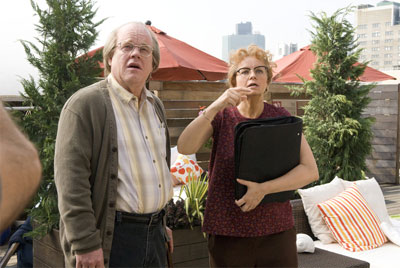 QUESTION: Really? That's interesting.
QUESTION: Really? That's interesting.PHILLIP SEYMOUR HOFFMAN: I've been asked to remount plays I've done. And I'm like-nah. Because once you've said au revoir to something, it's hard to invite that thing back. I think sometimes people don't say goodbye. Like, they get a connection to a role, and they don't do that. They stay with it. And then they do want to do it again. You know? But I don't have that. I might. But, no.
QUESTION: I was thinking that the possibility of coming back to a role after many years - after you've grown as a person, and perhaps your perception of the character might change.
PHILLIP SEYMOUR HOFFMAN: Yeah. I mean, I think - I understand what you mean, but there's a lot of roles that after many years you can't play any more, you're not supposed to play any more. And you've got to kind of give it up and go, "I'm not going to play that - I'm not going to - I've lost that chance." You know. Like, my chance at playing, like, Biff and Happy in Death of a Salesmen are running out, you know what I mean? No, but seriously. You think about things like that. You know. "I might not get a chance to play that part." But, no. I'm really good about working, working, working. And then you finish something, and it's done. And I like that feeling. I like that feeling of - not that you finish something. But that's - I've explored that. I did that, I went on that journey. That journey's now over, and now I have other journeys to get to. And I like that. I have no desire to play Caden again. I remember - because I remember Todd Solondz wrote a script that was a continuation of the characters from Happiness.
QUESTION: Interesting.
PHILLIP SEYMOUR HOFFMAN: This was years ago. I remember I was talking to him about it. And I remember reading it. And I remember calling him and going, "You know what would be really good, Todd? If you cast other people in the parts we played. That would be interesting." And he's like, "No, I know." He immediately knew what I meant. Cuz I was like, "Cuz Todd, I'm not playing that part again." And he knew. He laughed. He had a good laugh about it. But I think that's actually more appropriate. Because then you'd actually see those characters anew. Fresh.
QUESTION: Is there a classic character that you have a real yearning to play?
PHILLIP SEYMOUR HOFFMAN: Not really. Not really.
QUESTION: You're not one of those actors?
PHILLIP SEYMOUR HOFFMAN: No, because there's so many parts to play. And I love the new thing. I really do, I love new work. I really - I like doing Long Days Journey Into Night, you know. And I've done Shakespeare, and I've done The Seagull, and they're great. But working on a new piece is - there's something about that that's really something that I definitely am attracted to.
QUESTION: Could Phillip Seymour Hoffman ever become one of those actors who's taken on roles for his children? Like, children's movies? Or is there something that is out of your mind?
PHILLIP SEYMOUR HOFFMAN: I did an episode of Arthur. I don't know if you know that. It's a cartoon for children. I did an episode of Arthur. Yeah, totally. Yeah, I think that's a great reason to do a film. Like, if you found a great kids movie that you really liked, you thought was a lot of fun, and to do that and go take your kid to the premieres. I think that'd be fabulous. I just - that's never offered itself to me. That'd be cool.
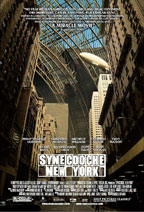
Synecdoche
Starring: Philip Seymour Hoffman, Samantha Morton, Michelle Williams, Catherine Keener, Emily Watson, Dianne Wiest, Jennifer Jason Leigh, Hope DavisDirector: Charlie Kaufman
Screenwriter: Charlie Kaufman
Producer: Anthony Bregman, Charlie Kaufman, Spike Jonze, Sidney Kimmel
Genre: Comedies
Runtime: 2 hrs 4 mins
Theater director Caden Cotard (Philip Seymour Hoffman) is mounting a new play. His life catering to suburban blue-hairs at the local regional theater in Schenectady, New York is looking bleak. His... Theater director Caden Cotard (Philip Seymour Hoffman) is mounting a new play. His life catering to suburban blue-hairs at the local regional theater in Schenectady, New York is looking bleak. His wife Adele (Catherine Keener) has left him to pursue her painting in Berlin, taking their young daughter Olive (Sadie Goldstein) with her. His therapist, Madeleine Gravis (Hope Davis), is better at plugging her best-seller than she is at counseling him. A new relationship with the alluringly candid Hazel (Samantha Morton) has prematurely run aground. And a mysterious condition is systematically shutting down each of his autonomic functions, one by one.
Worried about the transience of his life, he leaves his home behind. He gathers an ensemble cast into a warehouse in New York City, hoping to create a work of brutal honesty. He directs them in a celebration of the mundane, instructing each to live out their constructed lives in a growing mockup of the city outside.
However, as the city inside the warehouse grows, Caden's own life veers wildly off the tracks. Somewhere in Berlin, his daughter is growing up under the questionable guidance of Adele's friend, Maria (Jennifer Jason Leigh). His lingering attachments to both Adele and Hazel are causing him to helplessly drive his new marriage to actress Claire (Michelle Williams) into the ground. Sammy (Tom Noonan) and Tammy (Emily Watson), the actors hired to play Caden and Hazel, are making it difficult for the real Caden to revive his relationship with the real Hazel. The textured tangle of real and theatrical relationships blurs the line between the world of the play and that of Caden's own deteriorating reality.
The years rapidly fold into each other, and Caden buries himself deeper into his masterpiece. As he pushes the limits of his relationships, both personally and professionally, a change in creative direction arrives in Millicent Weems (Dianne Wiest), a celebrated theater actress who may offer Caden the break he needs.
MORE
- Viggo Mortensen The Road
- 24 Cast Reunion
- Aaron Eckhardt No Reservations
- Aaron Eckhart The Dark Knight
- Adam McKay Step Brothers Interview
- Alan Alda Diminished Capacity Interview
- Alan Alda Diminished Capacity Interview
- Alex Dimitriades
- Al Pacino Oceans 13
- Alan Rickman Snow Cake
- Alan Rickman Sweeney Todd



